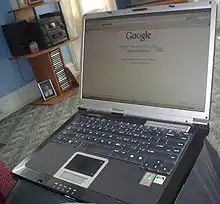eMachines
eMachines was a brand of economical personal computers. In 2004, it was acquired by Gateway, Inc., which was in turn acquired by Acer Inc. in 2007. The eMachines brand was discontinued in 2013.
 | |
| Product type | Personal computers |
|---|---|
| Owner | Acer Inc. (2007–2013) |
| Country | United States |
| Introduced | September 1998 |
| Discontinued | January 17, 2013 |
| Previous owners | Gateway, Inc. (2004-2007) |
| Company | |
| Founder | Lap Shun Hui |
History

eMachines was founded in September 1998 by Lap Shun Hui as a joint venture of South Korean companies Korea Data Systems and TriGem.[1] The company sold PCs at prices of $399 or $499, all without a monitor.[2]
By March 1999, the company was ranked fourth in U.S. computer sales, with a 9.9% market share.[1]
In August 1999, the company released the eOne, a computer that resembled the iMac, priced at $799, with a $400 rebate for customers who signed a 3-year agreement with CompuServe.[3]
In September 1999, the company announced plans to launch an internet service provider.[4]
The business acquired Free-PC in November 1999, which had previously provided free computers in exchange for advertising.[5]
In March 2000, at the peak of the dot-com bubble, the company became a public company via an initial public offering, raising $180 million. By that time, the company had sold 2 million computers, but had lost $84.5 million in the previous year on $815 million in sales and a 4% profit margin. Shares fell 8% in their debut. At that time, major shareholders included AOL with a 6.4% stake and Bill T. Gross with a 12.4% stake.[6]
By May 2001, the stock was trading at 38 cents per share and the company was delisted from the NASDAQ.[7]
In January 2002, Lap Shun Hui acquired the company for $161 million.[8]
In December 2003, the company released the T6000 desktop, the world's first mass-marketed AMD Athlon 64-based system, retailing at US$1,299. The systems were primarily sold through Best Buy stores, but the PCs were also available online.[9]
In January 2004, the company was the first to sell notebooks based on the AMD Mobile Athlon 64.[10]
In March 2004, the company was acquired by Gateway Inc. for 50 million shares of Gateway common stock and $30 million cash. Wayne Inouye, CEO of eMachines, became CEO of Gateway, replacing founder Ted Waitt.[11]
In October 2007, Acer Inc. acquired Gateway.[12]
On January 17, 2013, the eMachines brand was discontinued. [13]
References
- "Emachines Is Fourth in U.S. Sales of PC's". The New York Times. 1999-03-31. ISSN 0362-4331. Retrieved 2019-05-15.
- Schwartz, Ephraim (September 29, 1998). "Emachines readies sub-$500 PCs". CNN. Archived from the original on 2001-11-01.
- Kane, Margaret (August 6, 1999). "eMachines' iMac-like PC ships this week". ZDNet.
- Spooner, John G. (September 10, 1999). "eMachines.net not just another ISP". ZDNet.
- Gaw, Jonathan (November 30, 1999). "Low-Cost PC Maker EMachines in Deal to Acquire Free-PC". Los Angeles Times.
- Fields, Robin (March 25, 2000). "EMachines' IPO Takes 8% Dip in the Market". Los Angeles Times.
- "Irvine's EMachines Booted From Nasdaq". Los Angeles Times. May 25, 2001.
- Granelli, James S. (January 1, 2002). "EMachines Founder Buys Shares". Los Angeles Times.
- "eMachines selling loaded Athlon 64 system". Geek.com. December 11, 2003. Archived from the original on April 28, 2017. Retrieved June 4, 2018.
- "eMachines Introduces 64-Bit Wireless Widescreen Notebook Line; Company Is First Major PC Brand to Incorporate Mobile AMD Athlon 64 Processor for Mobile Computing" (Press release). Business Wire. January 19, 2004.
- "Gateway Completes Acquisition of eMachines" (Press release). Business Wire. March 11, 2004.
- Nystedt, Dan (2007-10-11). "Acer completes Gateway share purchase". The Washington Post. PC World. ISSN 0190-8286. Retrieved 2019-05-15.
- Shah, Agam (2013-01-24). "Acer sheds eMachines, turns to Gateway and Packard Bell for post-PC era". PCWorld. Retrieved 2019-05-15.
